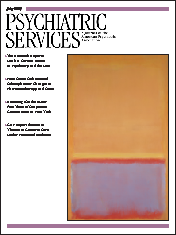Disaster Psychiatry: Intervening When Nightmares Come True
When I was asked to review Disaster Psychiatry: Intervening When Nightmares Come True, I initially expected a manual for training psychiatrists who work in what have come to be known as "all-hazards" situations. What I found was less a textbook and more a documented oral history of moving experiences and lessons learned from an extremely well-qualified collection of psychiatrists, assembled by two of the founders of Disaster Psychiatry Outreach (DPO), based in the New York area and predating September 11, 2001. The selected authors and personal accounts span a diversity of events and cultures yet easily unify under the overarching theme of clinical response and human suffering in disaster. Disaster psychiatry is an area of psychiatry that has yet to be well researched or clearly defined.
In fact, aside from DPO and the military, psychiatry is a latecomer to the field of disaster mental health. That, in and of itself, lends importance to the topic and also affords credibility to those who have been working in the field as it evolves. Collecting accurate study data about the emotional response to disaster is a difficult undertaking, raising ethical and logistic issues that are very difficult to overcome. Population statistics aside, these types of collective experiences essentially are the body of knowledge to date.
The editors state, "We deem it invaluable to consider what psychiatrists actually do in responding to disasters and, equally important, to consider how they think about their interventions, both during and after the events in question." From Claudia Sickinger's account of her time accompanying a family member to Ground Zero for the first time, to Mark Dembert's sobering yet sensitive recounting of the human response to body recovery by Navy personnel, it becomes clear that the role of psychiatrists and other mental health professionals in disasters is often nontraditional, is frequently unpredictable, and above all, requires flexibility.
Truthfully, in our current climate of competencies and guideline-driven education, it is a relief to explore the emotional content chronicled in the individual chapters of this book. The variety of experiences and diverse backgrounds of the authors add strength to the material. As the authors recount their personal exposures, it quickly becomes clear that this book is not light reading. The situations draw the reader into a very complex and at times painful emotional space. I found myself reading only a chapter or two at a time, feeling both severely drained yet, in retrospect, strangely hopeful. In the midst of their profound sadness and often overwhelming grief, the authors portray resilience, innovation, and creative new strategies for helping people recover. I highly recommend Disaster Psychiatry to anyone who plans to work or volunteer in the field of disaster or emergency psychiatry. On the other hand, given that disasters are by nature unplanned, any one of us might be immersed in similar situations. Perhaps we should all read the book.
Dr. Kantor directs the division of consultation-liaison, emergency, and community psychiatry at the University of Virginia in Charlottesville. He also sits on the Governor's Terrorism and Disaster Behavioral Health Advisory Council (TADBHAC) in Virginia.



